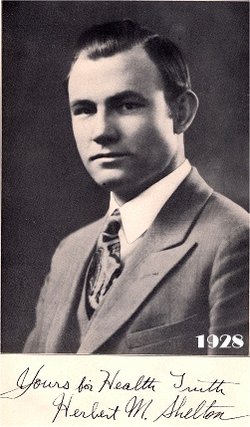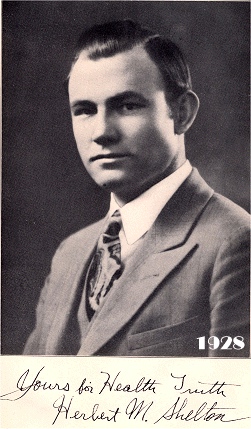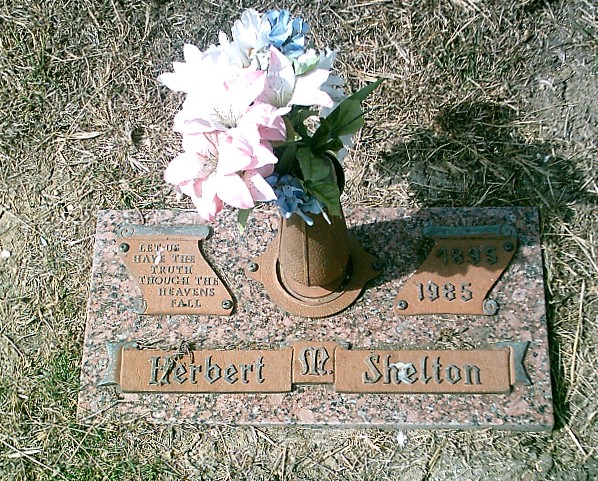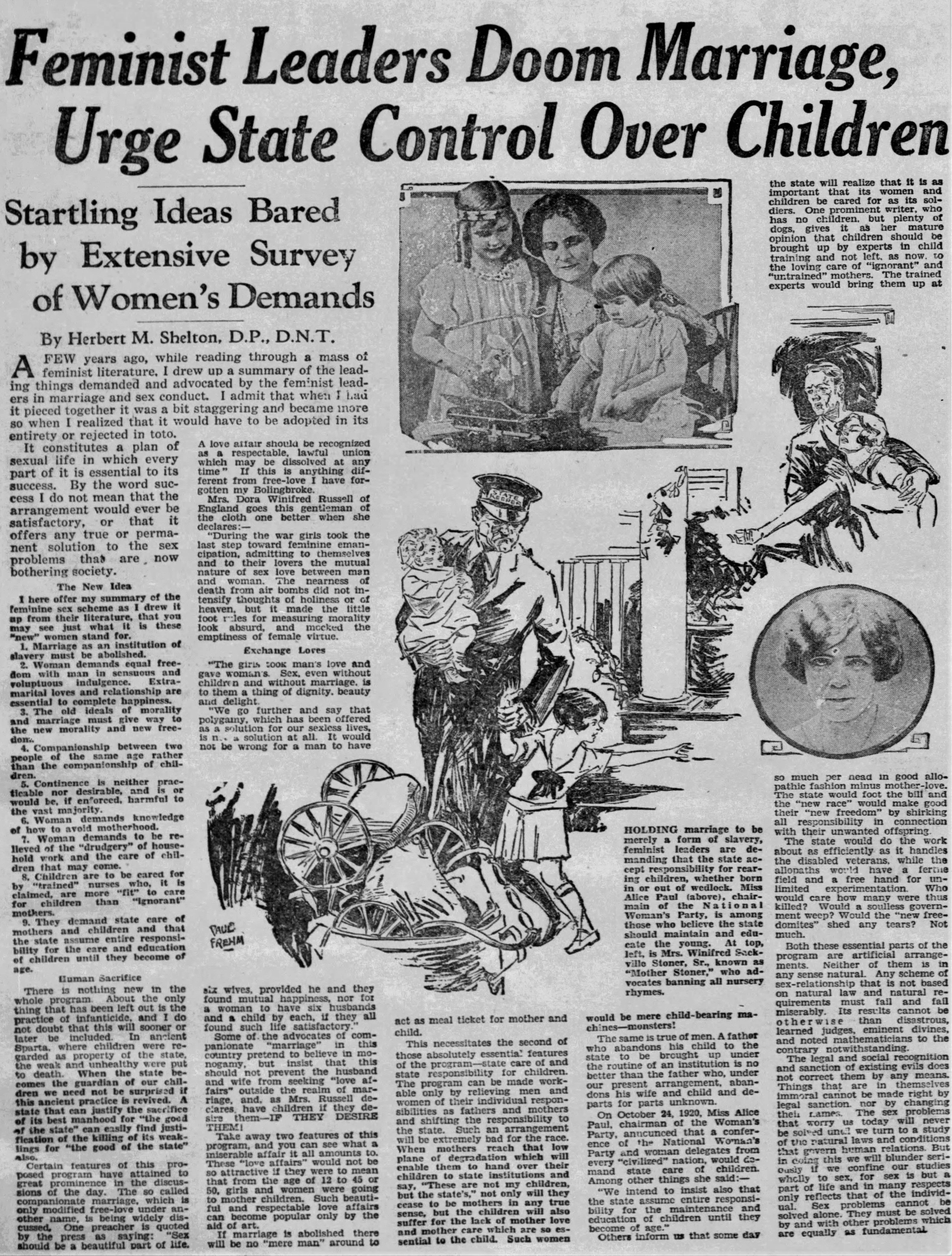http://en.wikipedia.org/wiki/Herbert_M._Shelton
Herbert McGolfin Shelton, N.D., (October 6, 1895 – January 1, 1985)[1] was an American naturopath, alternative medicine advocate, author, pacifist, vegetarian, supporter of rawism and fasting. Shelton was nominated by the American Vegetarian Party to run as its candidate for President of the United States in 1956. He saw himself as the champion of original Natural hygiene ideas from the 1830s.
Early life
Shelton was born on October 6, 1895 in Wylie, Texas to Thomas Mitchell Shelton and Mary Frances Gutherie Shelton, who were devoted Christians. As a child, Shelton took an interest in animals, especially their habits when sick as compared to when well. He was especially intrigued by their fasting when the farm animals became sick.
Career
Shelton attended Bernarr Macfadden's College of Physcultopathy [sic] in Chicago and interned at Crane's Sanatorium in Elmhurst, Illinois. He also attended Lindlahr College of Natural Therapeutics for post-graduate work and served at Lindlahr's and Sahler's Sanatoriums. Shelton later continued post-graduate work at Peerless College of Chiropractic in Illinois and served an internship at Crandall Health School in Pennsylvania.
In 1921, he married Ida Pape, studied at the American School of Chiropractic, and graduated from the American School of Naturopathy with a Doctor of Naturopathy (ND). He preached that cooking food denatures it, and that a healthy body has the ability to restore itself from illness without medical intervention. Although heavily criticized by his contemporaries for advocating fasting over medical treatment, Shelton's work remains relevant as an early influence of the raw food movement.[citation needed]
In 1922, Shelton self-published his first book, Fundamentals of Nature Cure. Seeing importance in the Hygienic Movement (launched in 1832 by Dr. Isaac Jennings and Sylvester Graham), he changed the title of this first book to An Introduction to Natural Hygiene. A later book, The Science and Fine Art of Fasting, exerted an influence on Mahatma Gandhi, who consulted the book before undertaking public fasts.
Shelton is credited with reviving the Natural Hygiene movement founded by Sylvester Graham.[3] He ran a health school in San Antonio, Texas even after becoming bedridden.
Death
By 1972, at the age of 77, he was completely bedridden from a degenerative neuro-muscular disease believed to be Parkinson's disease.[2] He died thirteen years later, unable to improve his own health despite many attempts. His contemporaries were shocked to see him unable to walk, speak normally, or write.
Toward the end of his life, most of his subsequent books were dictated in a whisper. He continued his involvement in Dr Shelton's Health School (now the seventh organization under that name).
In 1989, four years after his death, a biography of Shelton was published: Yours for Health: The Life and Times of Herbert M. Shelton by Jean A. Oswald, Franklin Books, Franklin, Wisconsin ISBN 0-9620490-0-X
http://en.wikipedia.org/wiki/Herbert_M._Shelton
Herbert McGolfin Shelton, N.D., (October 6, 1895 – January 1, 1985)[1] was an American naturopath, alternative medicine advocate, author, pacifist, vegetarian, supporter of rawism and fasting. Shelton was nominated by the American Vegetarian Party to run as its candidate for President of the United States in 1956. He saw himself as the champion of original Natural hygiene ideas from the 1830s.
Early life
Shelton was born on October 6, 1895 in Wylie, Texas to Thomas Mitchell Shelton and Mary Frances Gutherie Shelton, who were devoted Christians. As a child, Shelton took an interest in animals, especially their habits when sick as compared to when well. He was especially intrigued by their fasting when the farm animals became sick.
Career
Shelton attended Bernarr Macfadden's College of Physcultopathy [sic] in Chicago and interned at Crane's Sanatorium in Elmhurst, Illinois. He also attended Lindlahr College of Natural Therapeutics for post-graduate work and served at Lindlahr's and Sahler's Sanatoriums. Shelton later continued post-graduate work at Peerless College of Chiropractic in Illinois and served an internship at Crandall Health School in Pennsylvania.
In 1921, he married Ida Pape, studied at the American School of Chiropractic, and graduated from the American School of Naturopathy with a Doctor of Naturopathy (ND). He preached that cooking food denatures it, and that a healthy body has the ability to restore itself from illness without medical intervention. Although heavily criticized by his contemporaries for advocating fasting over medical treatment, Shelton's work remains relevant as an early influence of the raw food movement.[citation needed]
In 1922, Shelton self-published his first book, Fundamentals of Nature Cure. Seeing importance in the Hygienic Movement (launched in 1832 by Dr. Isaac Jennings and Sylvester Graham), he changed the title of this first book to An Introduction to Natural Hygiene. A later book, The Science and Fine Art of Fasting, exerted an influence on Mahatma Gandhi, who consulted the book before undertaking public fasts.
Shelton is credited with reviving the Natural Hygiene movement founded by Sylvester Graham.[3] He ran a health school in San Antonio, Texas even after becoming bedridden.
Death
By 1972, at the age of 77, he was completely bedridden from a degenerative neuro-muscular disease believed to be Parkinson's disease.[2] He died thirteen years later, unable to improve his own health despite many attempts. His contemporaries were shocked to see him unable to walk, speak normally, or write.
Toward the end of his life, most of his subsequent books were dictated in a whisper. He continued his involvement in Dr Shelton's Health School (now the seventh organization under that name).
In 1989, four years after his death, a biography of Shelton was published: Yours for Health: The Life and Times of Herbert M. Shelton by Jean A. Oswald, Franklin Books, Franklin, Wisconsin ISBN 0-9620490-0-X
Family Members
-
Alta May Shelton Broome
1897–1981
-
![]()
Lee Roy Shelton
1899–1975
-
![]()
Mrs Willie Shelton Pape
1903–1977
-
![]()
Zackery Shelton
1909–1974
-
![]()
Grace Shelton Slade
1911–1981
-
![]()
Walton Shelton
1912–1914
-
![]()
Bessie Shelton
1916–1922
-
![]()
Sam Rayborn Shelton Sr
1916–1994
-
![]()
MAJ Eugene Shelton
1919–1961
-
![]()
Lucy Juanita Shelton Haecker
1921–2015

















